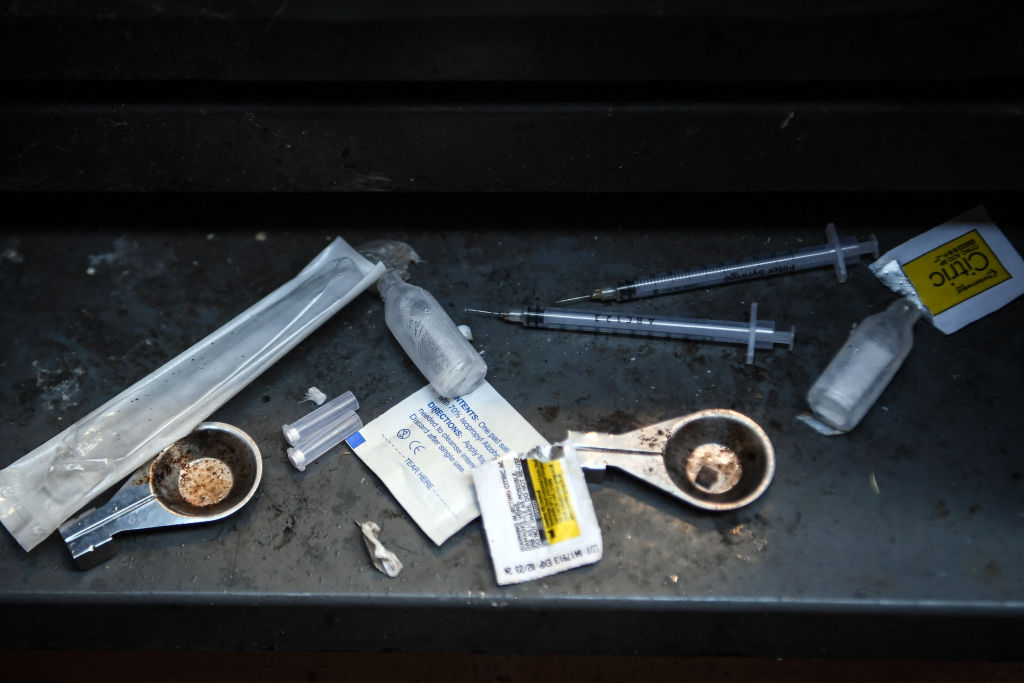Scotland is the drug deaths capital of Europe. Last year saw 1,051 drug misuse fatalities, a rate 2.7 times higher than that for the UK as a whole. The Lord Advocate, Scotland’s most senior law officer, has already issued guidance allowing police to handle possession of Class A and lower narcotics: with a recorded warning rather than arrest and prosecution. The Scottish government has called for the decriminalisation of all drugs and supports a shift to a health-based approach, a move it has already begun to make within its devolved competencies.
The problem has always been the Misuse of Drugs Act, the 1971 legislation which governs the policing and prosecution of possession and supply. That law is reserved to the UK parliament, meaning Holyrood can’t repeal or amend it. When Scottish Labour MSP Paul Sweeney proposed safe consumption rooms — facilities in which people can use drugs with first aiders and life-saving equipment at hand — I asked the Home Office what it made of the idea.
The response I got was chapter and verse of the 1971 Act. That answer is seen as less than satisfactory by Scottish policymakers who view this as a public health crisis. I have always been candid about my views when writing about this issue. As I’ve argued previously, Scots are being sacrificed to a failed drugs policy of prohibition and prosecution. Figures for 2022 saw a 21 per cent reduction in deaths but the Scottish government is aware that complacency could see that trend reversed. Something radical has to be done.
Something radical is going to be done, or at least attempted. Glasgow city council, the Crown Office, Police Scotland and the Scottish government believe they have MacGyvered a solution that gets around the Misuse of Drugs Act.
Step one was taken by Glasgow City Health and Social Care Partnership, an initiative bringing together Glasgow City Council and the local health board. The partnership drew up a proposal for a safe consumption room pilot in the city. The plan was drafted in cooperation with Police Scotland. Assistant chief constable Gary Ritchie confirmed the force would take ‘an overall supportive policing approach’ to any safe consumption pilot ‘within the confines of the law’. Ritchie did stress that officers would ‘still be bound by their legal duty’ and were not permitted ‘to simply ignore acts of criminality’.
The blueprint was then forwarded to Dorothy Bain KC, the Lord Advocate and head of the Crown Office and Procurator Fiscal Service. She is bound by the Act but she has discretion in setting prosecution policy in Scotland. After studying the proposal, she has offered to publish ‘a prosecution policy that it would not be in the public interest to prosecute drug users for simple possession offences committed within a pilot safer drugs consumption facility’. The policy would only apply to contravention of Section 5(2) of the Act, which deals solely with possession, and Bain says it doesn’t ‘amount to an exclusion zone whereby a range of criminality is tolerated’.
That’s where the Scottish government came in. Drug and alcohol policy minister Elena Whitham welcomed the Lord Advocate’s offer and said Glasgow’s leadership ‘may now progress their proposal to set up a facility which can operate within the existing legal framework’. The pilot scheme would have to be approved by the city’s Integration Joint Board but that is largely a formality. The UK government opposes the plan but it’s unclear how ministers could scupper it or if they would even be minded to try.
If this all sounds a bit too cutesy — an artful way of undermining the law rather than accepting that the legal status of drugs is reserved — remember that stubborn, horrific fact: the drug deaths capital of Europe. Politicians, policymakers, public health advisers and campaigners have argued time and again for the UK government to give the nod to a safe consumption room pilot. The Home Affairs Select Committee has even joined the calls. Too much time has been wasted; all patience is exhausted. If the mountain won’t come to Muhammad, Muhammad will have to rethink his mountain enforcement policies.
That there appears to be near unanimity across the narrow, incestuous, ideologically monochrome establishment that runs Scotland may raise a red flag for some. Small countries led by small elites can find themselves very far down the path of bad policy before realising it. We saw that with the Gender Recognition Reform Act. Could the same turn out to be true of safe consumption rooms? Perhaps, but there is evidence from around the world that they save lives, reduce public consumption of drugs and decrease paraphernalia-related littering. And the Glasgow scheme is nothing more than a pilot. If it goes terribly wrong, then it is likely that another approach will be pursued.
Scotland is taking a chance with this plan but the bigger risk surely lies with clinging to the lethal status quo. We’ve tried everything else and we have the mortality figures to show for it. It’s time to try saving lives.







Comments